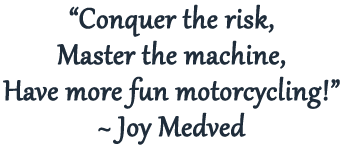Surviving a Traumatic Brain Injury
The Crash that Wasn’t a Crash . . .
As fate would have it, On March 3, 2016, Joy was involved in a second, more serious motorcycle crash. This time, there were no broken bones, no internal bleeding, and no collapsed lung. This time, despite wearing a high-quality helmet, Joy experienced a Traumatic Brain Injury (TBI) that, unfortunately, changed her life forever.
According to Joy, “The last thing you want while riding a motorcycle is a last-second miscommunication, and that’s exactly what happened. In 2016, I was riding with a friend, and we nearly collided. We each thought the other was going to take the lead through a curvy section of the road, resulting in both of us heading for the same line at the same time. It was a simple mistake that had very unfortunately consequences.”
The good news is that Joy had a lot of advanced training that kicked in at the perfect time. Joy was able to quickly execute a panic stop, engage threshold breaking (without ABS), and prevent crashing into the other motorcycle or riding off the cliff. Joy even successfully stopped her motorcycle without crashing! “Without my training and experience, I would have crashed – and I probably would not have survived.”
Confused? Right about now you’re probably wondering how someone successfully stops their motorcycle, preventing a crash, and still ends up hitting their head? Well, basically, physics! Joy was able to successfully stop her motorcycle, but she stopped so quickly that she was subsequently thrown from her motorcycle, landing square on top of her head. “My motorcycle had minor damage from falling over after I was ejected. I, on the other hand, hit the ground with such force, that, despite my high-quality helmet, I sustained a TBI. And, while my gear prevented any bodily injuries, I broke a number of teeth when my jaw slammed shut upon impact. Needless to say, it was not a fun time. But, I guess the universe felt I needed physics refresher,” Joy jokes.
Since 2016, Joy has been on the slow road to recovery. And, although Joy is now able to ride again, most of her life has changed, permanently.
Living with the Loss . . .
As a consequence of her 2016 TBI, Joy was forced to retire from her work as an international consultant and withdraw from graduate school, giving up her dream of becoming a professor. “I use to travel and work internationally. I loved what I did. I provided training at 5 or 6 international conferences every year. I even got to chair an international data quality conference in 2014, a highlight of my career. Now, that isn’t me anymore. 25 years of experience, and I can’t do many of the things I used to. I still have a lot of cognitive issues to work through.”
Also, prior to her TBI, Joy was working towards her PhD at a major university in Ireland. “I was researching visual data quality and wanted to develop an international study comparing cultural influences on visual communication for motorcycle and traffic safety. I was at the top of my career and was very much looking forward to getting my PhD. My biggest concern at the time was trying to figure out how to translate my work into Irish-English,” Joy laughs. “After hitting my head, my biggest concern was trying to remember to feed my dog.”
On the Slow Road to Recovery . . .
Thanks to Joy’s friends, she got a lot of support and encouragement, “I didn’t even realize the severity of my situation for quite a while. I don’t remember very much, but according to friends who stayed with me during the first couple of years, I had aphasia pretty bad, and I had a lot of issues communicating and understanding. In fact, I actually thought I was communicating quite clearly, and that it was everyone else who was illogical. I just couldn’t process information. My friends did a lot to hold me together.”
Aphasia was a major issue during the first few years for Joy, “I couldn’t come up with the right word. I had trouble explaining things. I didn’t understand when others tried explaining things to me. I stuttered, a lot. I also remember that I couldn’t talk with my eyes open. Every little sound was a major distraction to my thought process. The first couple of years weren’t too bad, because I didn’t realize I had a problem. Once I recovered enough to know I was impaired, however . . . well, then things were very challenging for me. I wanted to be correct. I wanted to understand and be understood, but that was extremely challenging and frustrating. I didn’t really understand how or why people couldn’t understand me.”
Over the past several years, Joy’s cognitive skills have continued to improve, and most of the aphasia issues have settled down; however, Joy is still unable to return to work or school. “I guess it was about two years in when I understood that I wasn’t going to return to my previously scheduled life. That hit me really hard. I’ve always been independent and self-sufficient. I went from reading and developing major research studies, to not being able to read at all. I didn’t know what I was going to do. I can read more now, but I have yet to read my first book. I just can’t retain story lines and details enough to get through the length of a book. Until I can read again, I know there is no way I can go back to school.”
Joy didn’t even know if she would be able to ride her beloved motorcycle again. But, Joy’s friends encouraged her to keep working on her cognitive skills, and encouraged her to get back on her motorcycle. They also encouraged Joy to get back to Joy of Motorcycling®. Wanting to get back on the motorcycle and experience the sheer joy of riding again, literally drove Joy’s recovery process, “Once I realized my situation, it seemed I would never be able to do the things I loved again, including riding my motorcycle. I thought I had lost everything. I had no identity anymore. But, I had a few close friends who never gave up on me. Thankfully, my friends, my motorcycle, and Joy of Motorcycling® were all still there, waiting for me.”
Meet Joy
Joy of Motorcycling®, the Early Years
Surviving a Traumatic Brain Injury


